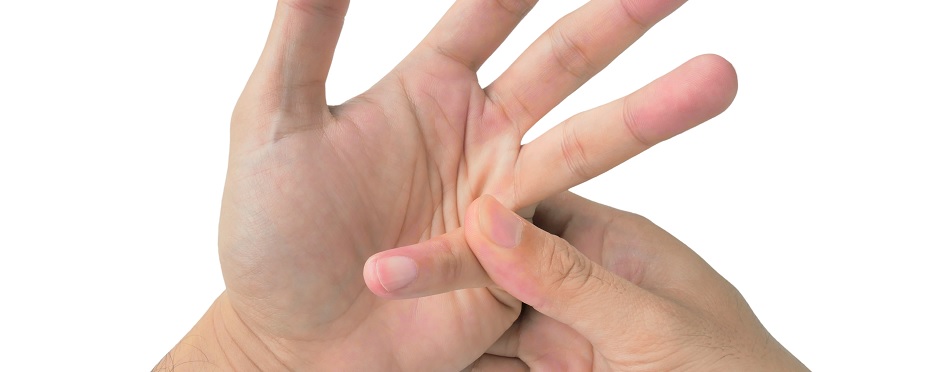
Will Cracking Your Knuckles Cause Arthritis?
Leave a CommentKnuckle cracking or popping is a habit that many people develop, despite being told it could cause arthritis or harm, but is that really accurate? Long story short, no it does not cause damage in a healthy person. Many start cracking their knuckles as a nervous habit, tick, restlessness, or they’ve noticed the looser feeling in their joints.
What Makes the ‘Popping’ Sound?
The sound heard when one cracks their knuckles is simply a release of gas, similar to when a carbonated beverage is opened. A variety of gasses are dissolved in the lubricating synovial fluid inside a joint. When one “cracks,” the joint or a joint is quickly moved after being still for a period of time, the stretching of the capsule lowers the pressure inside the joint and creates a vacuum, which is filled by the gas that was dissolved in the fluid. This creates a bubble of gas, which bursts, causing the characteristic, “popping,” or “cracking,” sound. It takes a bit of time for the gasses to re-dissolve in the synovial fluid, which explains why the knuckles cannot be immediately, “re-cracked.” The releasing of the gas bubble is harmless to the joint. When the bubble pops, it causes a disruption of the joint and the joint separates for a brief second. This quick traction to the joint, along with the release of the gas, can makes the joint feel more loose and mobile, which may explain why this can be a stress reliever to those who crack their knuckles.1,2,5,6
Debunking Myths
One study from 1990 loosely concluded that knuckle cracking leads to swelling or enlargement of joints and decreased strength. This study noted that laborers were more likely to be knuckle crackers. The study neglected to correlate that the laborers are more likely to have osteoarthritis, or wear and tear arthritis, from the nature of their work, which could be the source of the enlarged joints or weakness, and not the fact that they were knuckle crackers.3
When comparing x-rays of habitual, “knuckle crackers,” and, “non-knuckle crackers,” several studies have concluded that there is no difference in occurrence of osteoarthritis. However, in patients with weakened or damaged joints, forcefully placing them at end range to crack them, could potentially lead to further ligament injury or trauma.1,3,4,6
Ultimately, there is no definitive evidence that cracking one’s knuckles in a healthy hand, leads to arthritis, but if you already have weakened joints, it could lead to further damage. If you want to convince your child or a co-worker to stop the distracting habit, you will have to find a better reason than, it could be hurting your joints.1,4,6
Keeping Your Hands Healthy
Should you have questions about maintaining healthy hands, be sure to check out our various blogs on joint protections techniques. You can also contact an Athletico Hand Therapist who have specialized training and expertise in the treatment of arthritic conditions and injuries of the hands and upper extremities.
Find a Hand Therapist Near You
The Athletico blog is an educational resource written by Athletico employees. Athletico bloggers are licensed professionals who abide by the code of ethics outlined by their respective professional associations. The content published in blog posts represents the opinion of the individual author based on their expertise and experience. The content provided in this blog is for informational purposes only, does not constitute medical advice and should not be relied on for making personal health decisions.
References:
1 Center, Arthritis. “Arthritis News : Knuckle Cracking Q&A from Johns Hopkins Arthritis Center.” Johns Hopkins Arthritis Center, 20 Mar. 2012, www.hopkinsarthritis.org/arthritis-news/knuckle-cracking-q-a-from/.
2 Huntsberry, Shaina. “Does Cracking Your Knuckles Cause Arthritis?” Houston Methodist On Health, 8 June 2929, www.houstonmethodist.org/blog/articles/2020/jun/does-cracking-your-knuckles-cause-arthritis/#:~:text=The%20short%20answer%20is%20no,%E2%80%94%20but%20arthritis%2C%20not%20quite.
3 Castellanos, J, and D Axelrod. “Effect of Habitual Knuckle Cracking on Hand Function.” Annals of the Rheumatic Diseases, vol. 49, no. 5, 1990, pp. 308–309., doi:10.1136/ard.49.5.308.
4 Swezey, Robert, and Stuart Swezey. “The Consequences of Habitual Knuckle Cracking.” The Western Journal of Medicine, vol. 122, May 1975, pp. 377–379.
5 Meals, R., (2008) The Hand Owner’s Manual p.24.
6 Robert H. Shmerling, MD. “Knuckle Cracking: Annoying and Harmful, or Just Annoying?” Harvard Health, 14 May 2018, www.health.harvard.edu/blog/knuckle-cracking-annoying-and-harmful-or-just-annoying-2018051413797.
